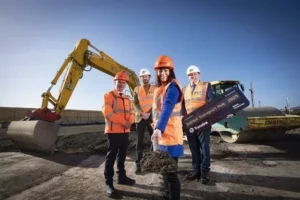The property sector has called on the Government to deliver a clear plan on transport infrastructure to help address regional inequality,
It has called for ‘national unity’ to build back better and has warned that the ‘levelling down’ of London will harm UK growth. It also asks for greater devolution of decision-making and funding powers to unlock rapid-transit schemes.
A new body of research argues a lack of urgency and vision on delivery of transport infrastructure across the North and Midlands is undermining ‘levelling up’.
As Britain recovers from the pandemic and looks towards rebuilding the economy, it warns that without greater connectivity within and between cities, as well as into HS2 and the rest of the national rail network, city regions will continue to lag behind.
Jointly commissioned by not-for-profit trade bodies London Property Alliance and Sheffield Property Association, which together represent over 500 leading property companies across Central London and South Yorkshire, the paper, authored by global real estate advisor JLL, has issued a 10-point-plan to build back better (see below)
Responding to the research, Andy Burnham, Metro Mayor for Greater Manchester has endorsed the study and comments in the report’s foreword: “Across the world, the most successful city-regions have one thing in common – an affordable, integrated and accessible transport network.
“That is why I have spoken passionately about the fact Greater Manchester requires a fully-integrated ‘London-style’ transport network since taking office in 2017. Not only will it benefit the everyday lives of people by providing a real alternative to the car, cutting congestion and cleaning up the air it will also support the continued economic development and success of the region.
“Transforming everyday transport in places like Greater Manchester is arguably the single best way to level-up. It’s something where real, tangible change can, with the necessary impetus and vision, be delivered on the ground quickly to benefit not only public transport users but, when combined with housing, planning, environmental and wider economic policy, every part of a community.
“I welcome the contribution of this report towards creating a national consensus on the contribution that public transport can make to our country’s future.”
The report makes a series of recommendations to Government based on a detailed study of rapid-transit systems in cities across Europe and in North America. The recommendations include:
- Politics and ambition
- It is imperative that national government should support Metro Mayors and combined and local authorities in their ambitions to roll out rapid transport systems.
- Public-Private Partnership
- There is a substantial and rapidly growing quantity of ‘patient capital’ looking for infrastructure investment opportunities. The UK must embrace public-private partnerships where public resources may be insufficient to get things built
- Innovative Funding
- More revenue raising powers should be devolved to local and regional government.
- Properly thought-through, lasting local taxation measures, combined with locally shaped priorities, are the best route for funding new transport schemes.
- Tram-trains and guided busways offer very significant potential for extending tram networks at a lower cost over the longer term
- Strategic Planning
- Planning and funding of major new transport needs to be aligned and needs to be planned and delivered at a level above that of the local authority
- For larger-scale stations, planning needs to take account of wider public realm problems and regeneration opportunities.
- Future planning reform needs to recognise the link between new transport, housing and driving economic growth. The upcoming Planning White Paper should provide the opportunity to address this.
Professor Tony Travers, Director, LSE London, added: “As ‘levelling up’ has become a political priority, particularly since the 2019 general election, it has become entwined with devolution. Mayors, including Andy Burnham, Steve Rotheram and Andy Street have argued that without further devolution of powers and resources, it will be impossible to increase prosperity in city regions in the Midlands and the North of England.
“This report, City Region Connectivity, explores the importance of ‘within city region’ transport to boost productivity, inward investment and image. To achieve the scale of change required, metro mayors will require access to powers that will allow them to raise resources, develop schemes and capture benefits which are currently held by Whitehall.”
Charles Begley, Executive Director of London Property Alliance, said: “The ad hoc nature of transport investment and the absence of a clear and coherent strategy is one of the major barriers to levelling up and driving social and economic prosperity across all regions of the country.
“We urgently need to unlock the potential of all regions and this can only be achieved through uniting the country, not dividing it. We hope our recommendations will support the Government’s desire to build back better.”
Martin McKervey, Chair, Sheffield Property Association, said: “A lack of urgency and vision from Government on transport infrastructure has not only stymied growth and impacted productivity in and around regional cities, it risks undermining its own ‘levelling up’ agenda.
“City regions need greater autonomy and funding, supported by a national strategic vision. Regional leaders also need to step up as success requires strong City leadership to ensure their cities and surrounding towns can develop, with housing, jobs and transformative developments linked to new transport.”





















